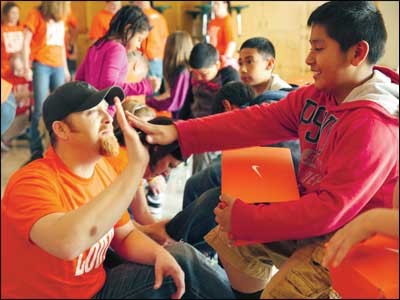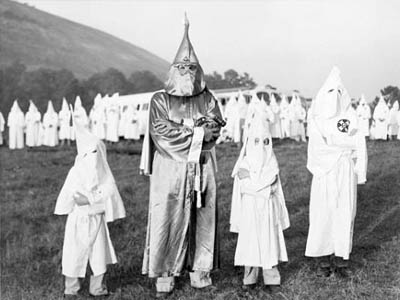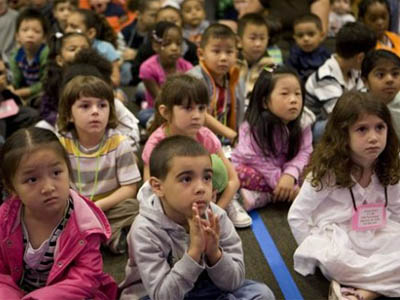“Come along, my little ones! Lollipops! Ice cream! Chocolate! All free today!”
–The Child Catcher, Chitty Chitty Bang Bang, United Artists, 1968
On April 10, Biltmore Baptist—a rapidly-growing megachurch based in Arden, North Carolina—donated fourteen hundred pairs of Nikes to students of the Macon County Public School District in nearby Franklin, home to one of their satellite campuses. Ministers from LoveLoud, the charitable outreach organization of the church, arrived during school hours dressed in bright orange uniforms emblazoned with the LoveLoud logo. They set up tables, chairs, and stacks of shoeboxes in the gym, and children whose parents had signed a consent form queued up in happy anticipation. Church members knelt before the children, chatting amiably, measuring feet and fitting shoes. Photographers were on hand to record the event, resulting in countless strained high-five multicultural photo-ops that eventually found their way onto the Biltmore Baptist website.
THE WOWZERS HEARD AROUND THE WORLD
On April 11, Betty Cloer Wallace, former Superintendent of Vance County Schools in North Carolina—in response to a puff piece about the event that had appeared in the Macon County News the previous day—began a thread on the wall of the Facebook forum You Might be From Franklin NC if . . .:
“Wowzers! When was it that the Macon County Board of Education began to allow churches and businesses to go into all our schools and proselytize by advertising their products? Certainly great free advertisement for churches and businesses, but this kind of thing used to be really avoided, for obvious reasons. So when did this change in policy become okay in Macon County Schools? Really.”
The Facebook forum, typically a platform for less controversial forays such as You Might be from Franklin NC if . . . you ever ate a hamburger at the Carolina Pharmacy on Main Street was immediately overrun with rancor.
Gone were the birthday wishes, the notices about lost Jack Russell terriers, the recipes for frozen pink lemonade pie, the rattlesnake alerts, the reminders of upcoming gemstone jamborees and folkmoots. Gone the local painter who regularly posted her awkward oil paintings of wolves. Gone the man who made stringed instruments out of empty cans of Spam.
Things got ugly. Fast.
“This might be the most passive-aggressive . . . whiney-toned . . . sour grapes tastin’. . . plain old dumbest gripe I’ve ever read on any Facebook page. Anytime. Anywhere.”
“Where is the MIND YOUR OWN BUSINESS, and if it doesn’t affect you don’t stick your nose in it?”
“. . . how about you stop polluting Facebook with all of your CRAP TALK and find something else to do!!!!!”
More even-toned supporters of the charity said, in essence: “What’s the big deal? The kids needed shoes, we gave them shoes. Who would deny poor children shoes?”
Some brought up the fact that several other charitable programs work through, or in tandem with, local schools:
“Do you have a problem with the Holiday Angels program? It is based thru MPP and schools. Many businesses, individuals and churches . . . YES CHURCHES adopt those families at Christmas and represent themselves at the time of giving their gifts. Imagine that . . . businesses, individuals and churches out doing God’s work!!”
There were those who pointed to the absence of religion in schools as a probable cause of societal decay:
“It was a good deed, PERIOD!!! In MY OPINION the problems and tragedies we all face in this world ‘together’ are a direct result of taking God out of school!”
“Removing God from our schools and lives is exactly why we have turmoil in them now!! Stabbings, shootings, rapings . . .”
Free Nikes might have prevented Columbine.
Others, some of them churchgoers, still saw a conflict of interest:
“. . . does no one other than Betty see the absolute Constitutional issues involving the 1st Amendment here? It is a PUBLIC school. By definition, religion is not supposed to be promoted inside its walls, and that goes for any religion. Not Christians, not Muslims, not Jews, not Buddhists . . . The Constitution is The Constitution . . . Government can’t show a preference for one religion over another, or for religion over no religion at all.”
One commenter leapt on this inversion:
“What if the KKK wanted to give out shoes? Or a Muslim Mosque?” Would that be okay? “Suppose these shoes were given out by an Al Qaeda branch who were known to be recruiting for attacks against Christians?”
Which spawned a sub-thread of its own:
“The PARENT’S would still have to sign the permission slips . . . that’s the POINT! If the KKK or Al Qaeda were to present this to the school board, the Board would have to send out permission slips!”
“Exactly! If the school asked if I wanted to sign a PERMISSION SLIP for my child to receive shoes from KKK, I would refuse . . . No one FORCED the shoes on anyone. No one FORCED parents to accept them because they were or weren’t from a church. I chose to let my child get the shoes. Permission slip signed. Policy taken care of! Good grief, it really is so simple.”
Suddenly the local elementary was a potential staging ground for domestic terror attacks. Provided the proper forms were filled out, of course.
And soon every crank and fanatic within a hundred mile radius got up on the soapbox to sound off.
And secretly everyone longed for frozen pink lemonade pie.
A BRIEF DISCLAIMER
I am certain that no one from Biltmore Baptist Church or the LoveLoud ministry wants to harm children, brainwash them, or send them away with the Child Catcher from Chitty Chitty Bang Bang. But there can be no question that they are actively involved in proselytizing young adults and children, as a quick glance at their website will reveal.
At Biltmore Baptist’s satellite campus in Franklin, “Kids have their own worship service designed specifically for them. The Student Ministry meets during the week, and worships with the adults on Sunday.”
They are committed to outreach to the unengaged and ‘unchurched,’ and they make no bones about it: “. . . we are making bold and aggressive efforts to plant new churches in [. . .] major population centers.”
To be fair, most congregants believe that the unchurched will literally go to Hell without intervention—that Ha-Satan, a deity of lies and evil who struggles for dominion over our souls will drag us down into the pit of Hell where we will suffer eternal punishments most severe. So spreading the word about Jesus Christ—who is both an incarnation of, and the Son of, God—is key. If you accept Him into your heart and try to live an ethical life, you can skip Hell and go to a place called Heaven, which is incredibly nice, situated somewhere in the sunset clouds, where there are lots of cottonswabby lambs, and honey, and it’s probably sourwood honey too, which is delicious.
It couldn’t be more generous of them.
THERE ARE 255 OF THEM BORN EVERY MINUTE
Nothing is more costly than something given free of charge
—Japanese saying
Advertisers and salesmen have long known that giving gifts inspires feelings of gratitude and encourages reciprocity. It is not charity that compels grocery stores to hand out free samples of Swedish Meatballs
As Dr. Wallace pointed out in the Franklin forum: “. . . it’s all about cheap free marketing and advertising for the enterprise, whatever it is and whoever does it . . . Marketing and advertising and promotion. News print copy. Online advertising. Marketing 101. Here is the final goal for any enterprise—to build allegiance to a brand by starting with children. It does work, doesn’t it?”
McDonalds seems an obvious example. The Happy Meals with the free toys inside. The cheerful mascots. The colorful PlayPlaces. Advertisers and salesmen have long known that if you engage customers while they’re young you can build brand loyalty for life.
But the people who gave out the shoes didn’t preach, they just gave out the shoes.
As yet another Franklin forum commenter put it: “The agency distributing the shoes didn’t use the opportunity as a platform while distributing, and certainly didn’t hold kids captive in the gymnasium and preach to them about their religious perspectives.”
So who cares?
REBRANDING THE WORD OF GOD
Twenty years ago, the Southern Baptist Convention was a holy backwater. With a history that included endorsements of institutionalized slavery and the subjugation of women, they were characterized as Bible-thumpers, tent evangelists, snake charmers. Membership was on the decline.
Enter the megachurch. It’s big, it’s inclusive, it’s non-traditional. A large portion of every service is dedicated to loud Christian rock music. Instrumentalists, singers, and dancers cavort across immense stages rigged with blazing spot rigs and deafening Marshall stacks. During hymns, Bible verses slide across multiple massive TV screens. Some of the largest resemble shopping malls, with coffee shops, gymnasiums, and game rooms, where casually dressed ministers chat with worshippers in an informal atmosphere. The graphics on their websites look like ad copy for Urban Outfitters—hip, contemporary, fun. A tribute, perhaps, more to market research than to the appeal of faith, the megachurches reflect a dawning awareness that in order to grow an aging ministry, you have to attract a younger flock.
And it’s working. There are currently 1300 megachurches in the United States, and that number is rapidly growing.
Compare Biltmore Baptist to the Lakewood Church of Houston, Texas, with 43,500 weekly attendees, or the nearby NewSpring Church of Anderson, South Carolina, with 27,158, or the Saddleback Church of Lake Forest, California, with 22,055, and it hardly seems to rate the mega. With membership numbering just over 6000 weekly attendees spread over three campuses, it is one of the smaller examples. But it’s also recognized as one of the fastest-growing churches in the country, with over 1300 new members baptized in just the last three years.
And LoveLoud is at the forefront of their outreach campaign.
CHILDREN’S CRUSADE

“One of the most common indications that a child is thinking about Christianity is persistent questions about salvation, sin, death, or even hell.”
—from Children and Salvation, Lifeway Church Resources
There are several groups that focus on proselytizing children. The Child Evangelism Fellowship (CEF) is an American children’s ministry dating back to the thirties. Their Good News Club, an evangelical after-school program, is criticized by opponents for informing children that they are “born wicked and deserve to be punished for eternity,” and terrorizing them with “vivid descriptions of hell and apocalypse” and “using public spaces to lead children to believe their fundamentalist views are endorsed by authority figures.”
According to a recent post by Seattle psychologist and writer Valerie Tarico: “Good News Club tells children as young as preschoolers that they have ‘dark’ and ‘sinful’ hearts, were born that way, and ‘deserve to die’ and ‘go to Hell.’”
(Decide for yourself. Official curriculum here. Nicely digested here.)
And it’s legal: The CEF won a 2001 U.S. Supreme Court case (Good News Club v. Milford Central School,) allowing them to hold chapter meetings on school grounds. Since then, they have opened more than four-thousand Good News Clubs nationwide. According to the CEF website, “We do not pressure or coerce children, and we respect the wishes of their parents or guardians. We believe we have a wonderful message from Scripture, and we are happy to share it with those wanting to hear. Since children establish moral values early in life, they have a right to hear the Gospel if they desire, and we have a biblical obligation and the constitutional right to share the message of Jesus.”
“God used CEF to reach over 15.6 million children last year.” Mainly in Zambia, where they are permitted to proselytize in schools and—seemingly—everywhere else. ‘This year workers in Zambia have been able to reach children in Open Air, schools, Party Clubs, Good News Club, a day camp and other outreach ministry. At one event, 3,408 people heard the message of salvation.” One gets the impression that the children of Zambia have nowhere they can go where they will not hear the word of God.
Stateside, the battleground for children’s souls is waged in Portland between the CEF and Protect Portland Children, a group organized to monitor and protest the Fellowship’s encroachment upon the public sector.
And the CEF is not alone. The group Ministry-To-Children has developed a method they refer to as backpack evangelism. “We wanted to teach kids how to share the gospel with school friends using common school supplies.”
Children are encouraged to use items found in their backpacks to proselytize their classmates. “These backpack ideas make it easy for kids to share their faith with their peers on the bus, on the walk home or wherever the opportunity arrives.” (Like during a lull in History, for instance, or Science.)
The method includes symbolic lessons using blank vs. scribbled-on pieces of notebook paper to illustrate the difference between virtue and sin; the equation of the unbearable weight of schoolbooks with the unbearable weight of life; the random unrestrained punching of the multiplication key on a calculator to symbolize the snowball of unrepentant sin; and this:
Pencils: I hold up the unsharpened pencils and let everyone look at them. I ask kids questions like, “Can we write our homework with these pencils?” Kids will say no. Then I say, “What do we need to do write our homework?” Kids will say “Sharpen them!” I say, “Did you know that when you live without Jesus you are like this unsharpened pencil? God can’t write anything nice on our lives when we remain unsharpened. Who wants to be a sharpened pencil for God?”
SQUARE-Y KRISHNA
When I was little, my mother and I took a road trip to Florida to visit my grandfather who was languishing in a rest home with dementia. Just over the border, we made a pit stop at the Florida Welcome Center to use the restrooms and drink free orange juice. I finished up before my mom did and went back out to the car.
I was sitting in the passenger seat with the door open and my legs dangling out, cooling myself in the breeze, when this clean-cut college-aged guy in nerdy Clark Kent glasses came striding up, knelt down on the asphalt beside me, and started chatting.
This was a few decades ago, when there weren’t so many child abductions in the news, and long before Amber Alerts. It never would have occurred to anyone that I would be in any danger at the Florida Welcome Center.
He asked me innocuous questions—about the weather, about where we were from, where we were headed. I remember him commiserating with me about how tough it was being a kid, how everybody was always trying to tell you what to do. I remember thinking that he was a nice guy. I remember thinking that he understood me in a way that no adult ever had.
By the time he started telling me about how great it was to be a Hare Krishna, my mom had gotten back to the car. She slid into the driver’s seat and the Krishna said, “Hey mom, do you want another son?” winking at me, like that was our joke.
“No thanks,” my mom said. “Close the door, Larry.” The man stood up and I closed the door, but before we pulled away he leaned in through the window and handed me a sheaf of pamphlets and some hard candy.
As we drove deeper into the panhandle I leafed through the pamphlets. There were glossy pictures of alien-looking men and women with shorn hair, golden symbols painted on their foreheads, teeny ponytails trailing down their backs. Articles about meditation, chants, and mantras.
It turns out that at the time—in the conservative 80s—the Krishnas where going through an identity crisis of their own. Far from having to deal with PR problems like condoning slavery or the subjugation of women, the Krishnas were considered too weird, too eccentric, too tied up in sixties counter-culture. Their presence at bus terminals and airports had begun to attract the wrong sort of attention.
They decided to rebrand themselves by sending out—instead of men and women with golden symbols painted on their foreheads and teeny ponytails—conservative young people. The Alex P. Keatons of proselytization. Instead of begging for alms and aggressively trying to convert people, they gave away pamphlets and hard candy, refusing to take them back in a conscious effort to compel potential initiates to return the favor.
To be fair, devotees would gladly instruct you on how to deliver yourself from the evil age of Kali through the establishment of permanent Krishna-consciousness by way of Bhakti-yoga, ethical living, chanting the Maha Mantra, and devotion to Krishna—seventh incarnation of Vishnu, the Supreme Godhead, usually depicted as a blue cowherd in a yellow silk dhoti and a peacock feather crown who plays the flute.
It couldn’t be more generous of them.
REDUCTIO AD ABSURDUM
All this generosity has inspired me with a vision of my own. A vision of a world where people of all faiths and allegiances might have unrestrained access to our children. A world where they might receive composition books from Shintoists, pencil sharpeners from Zoroastrians, crayons from the Falun Gong, colored pencils from Rodnovers, pencil cases from Scientologists, ballpoint pens from Hòa Hảos, trapper-keepers from Saivists, glue sticks from Neopaganists, protractors from ECKists, erasers from Bahá’ís, scissors from Caodaists, binders from Ásatrúarmaður, filler paper from Tenrikyōs . . . all delivered by laid-back approachable high-fiving devotees with brightly colored logos on their uniforms.
I see no reason why everybody can’t have a crack at them.
ABSTRACT
To those who would argue that the CEF and Ministry-to-Children are extremists, and that LoveLoud is an entirely different animal, and to those who would argue that I am making unfair comparisons between McDonalds, the Hare Krishnas, and megachurches: I say that I am simply comparing methodologies. Christianity is one of just over four thousand cults currently active on planet earth, and while its successes (high-five, Emperor Constantine) may or may not be based on God’s providence, its marketing techniques are firmly terrestrial.
This is why people are on the alert. It’s not about the merits of a charitable donation of shoes, it’s about the constant creep of religion into the public sector. Even if the ministers who sized the student’s feet and handed out the boxes of sneakers never made mention of God, by wearing the church logo (and inviting news media to publicize the event) their associations could not be clearer. Allowing churches to proselytize children on public school grounds constitutes a tacit endorsement of religion, a violation of the separation of church and state.
Betty Wallace and her supporters propose a sort of secular heaven, where public schools remain a neutral zone, where advertising and proselytizing are off limits, where kids can go to science class and learn verifiable facts, and remain protected from the undue influence of those who would—be it through goodwill or wickedness—bend the protections put into place by the framers of our constitution, individuals who experienced firsthand the evils enacted in the name of God.
It couldn’t be more generous of them.







